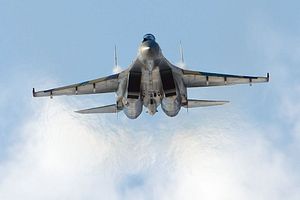Pakistan is threatening to procure Chinese or Russian fighter aircraft should U.S. lawmakers continue to block financing for Islamabad’s purchase of eight U.S.-made F-16 Block-52 fighters under the so-called Foreign Military Financing (FMF), the Financial Times reports.
“If funding is arranged, Pakistan will get the F-16,” Sartaj Aziz, a foreign affairs adviser to Pakistani Prime Minister Nawaz Sharif, told the Financial Times. “Otherwise, we will opt for jets from some other place.”
According to an official of Pakistan’s Ministry of Foreign Affairs, Pakistan is now considering other options including Chinese-made Chengdu J-10 lightweight and J-20 stealth fighter aircraft (still in the development stage), as well as Russian Sukhoi Su-35S multirole fighter jets.
In February, the U.S. State Department approved the possible sale of the F-16 fighter jets to Pakistan. However, fierce congressional opposition repeatedly delayed the signing of a final contract, and in the first week of May U.S. State Department spokesman John Kirby, announced:
While Congress has approved the sale, key members have made clear that they object to using FMF (foreign military financing) to support it. Given Congressional objections, we have told the Pakistanis that they should put forward national funds for that purpose.
As a result, Pakistan would now need to pay $700 million instead of the original $270 million for the eight F-16 fighter jets—a price increase of two-and-a-half times the original cost. It is highly unlikely that Pakistan will move forward with the purchase under such conditions.
However, it is even more unlikely that Pakistan will induct new fighter aircraft types such as the Chengdu J-10 or Sukhoi Su-35 into the PAF, given the logistical difficulties, extra maintenance cost, and additional training requirements that a new fighter aircraft acquisition would entail.
The PAF currently has in service around 70 F-16 fighter aircraft, as I explained in October 2015:
Forty F-16 fighters were first introduced to Pakistan’s Air Force (PAF) in the 1980s. However, due to the 1985 Pressler Amendment, the United States cancelled the sale of an additional 28 F-16s in 1990 and imposed sanctions on Pakistan because of its burgeoning nuclear weapons program.
In 2006, a contract was signed between the United States and Pakistan over the purchase of 18 new F-16C/D block 50/52 aircraft with an option for another 18 more. The first three F-16C/Ds were delivered in June 2010 with the rest inducted into the PAF by the end of 2012. That same year, the United States delivered 14 used F-16s to the PAF.
The PAF also operates over 60 Pakistan Aeronautical Complex/Chengdu Aerospace Corporation (PAC/CAC) JF-17 Thunder combat aircraft. Should the F-16 deal fall through, the PAF is more likely to invest in additional JF-17 aircraft than to opt for new Chinese or Russian models.































